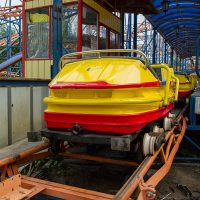Amusement Park Accidents: Is It The Human’s Fault, Or The Machine’s?

When we think about the safety of amusement park rides, we often look at the rides themselves. Are they maintained properly? Are they designed properly? Are they being inspected? But while technology has made it so that most of the rides we are on are mechanically sound, there’s one “weak link” in amusement park safety that technology can’t solve: the humans that operate the amusement park rides.
Humans Need Watching
Humans still rely on good old fashion training and monitoring. And a ride is only as safe as the person that is operating it. That operation can include doing things like inspecting passengers for height weight requirements, or making sure that passengers are buckled into ride seats, or noticing that a ride or a part of it, just doesn’t look right.
The Tragedy at Icon Park
Some of the worst amusement park ride accidents seem to be the result of human error, more so than mechanical error.
In 2022 in Orlando’s Icon Park, a young boy was on a ride that shot riders high into the air. The ride was one where passengers were bolted or belted into a seat, but there was nothing under the seat, as the seat rose higher in the air.
Like many rides, the ride had height and weight requirements. But the boy, being a young football player, was much bigger than normal-sized boys his age. He came undone from his belt, and slid off the seat, falling to his death.
While there is some indication that the ride itself may have malfunctioned, most people agree in retrospect, that the fault was that of the ride operator, who allowed someone that was bigger or heavier than the ride allowed, to get on the ride.
Who is Watching the Rides?
Who are these amusement park workers? There’s really no way to know, because there are no federal or state guidelines on who can and who cannot, operate a ride. In some more reputable parks, like Disney or Universal, employees may be a bit more trained—they are better paid, and those establishments may take safety more seriously.
But in other, more local, or more transitory rides (like at carnivals), the people operating the rides may be younger, or less attentive to what is going on. The jobs can be monotonous, and there is rarely anybody in a supervisory capacity, that is looking after the ride operators.
How Much is Human Error?
By one estimate, about 70-90% of all ride accidents are the result of human error. But that’s also a misleading statistic, because it includes both errors by ride operators, and by passengers (which is a common defense in amusement park accidents—that the rider didn’t follow safety requirements).
It also doesn’t account for predictable misuse—for example, someone holding their hands up on a roller coaster—a predictable, anticipated thing for a passenger to do, even if it technically is against the safety rules of the ride.
Were you injured on an amusement park ride? Contact our Rhode Island personal injury lawyers at Robert E. Craven & Associates at 401-453-2700 today.
Sources:
cnn.com/2023/03/17/us/orlando-freefall-tower-dismantled-tyre-sampson/index.html
cedtechnologies.com/amusement-park-ride-accidents/

